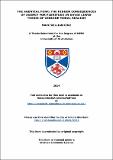Files in this item
The agential fork : the hidden consequences of agency for plenitude in David Lewis' thesis of genuine modal realism
Item metadata
| dc.contributor.advisor | Ball, Derek Nelson | |
| dc.contributor.advisor | Hawley, Katherine (Katherine Jane) | |
| dc.contributor.author | Cole, Marc William | |
| dc.coverage.spatial | 126 | en_US |
| dc.date.accessioned | 2015-04-23T13:40:18Z | |
| dc.date.available | 2015-04-23T13:40:18Z | |
| dc.date.issued | 2015-06-25 | |
| dc.identifier.uri | https://hdl.handle.net/10023/6551 | |
| dc.description.abstract | In this dissertation, I argue that David Lewis' abductive argument for Genuine Modal Realism (GMR) has the unwelcome, and hidden, implication of being unable to accommodate agent causation theories of free will. This is because of his formulation of plenitude, which basically says that every way that a world or a part of a world could be is the way that some world, or part of some world is. This formulation tacitly assumes that chance and nomological principles are sufficient to account for everything that happens at worlds. However, agent causation theories argue that free will is neither reducible to chance nor determined by physics. My argument recasts a fork argument made by Andrew Beedle. I proceed by arguing that chance-based principles evince an ontologically distinct kind of modality than agent causation principles. However, plenitude only accounts for the physics/chance-based kind of modality. There is no similar principle of plenitude that can be given for agential modality that does not collapse into the chance-based principle. But even if such a principle could be found, it would violate the doctrine in GMR that claims worlds are causally isolated. If no agential plenitude principle can be found and there is agential modality, then plenitude fails. If there is no agency at our world, and Lewis’ original formulation of plenitude is correct, then GMR implies no agency at any world. This is the fork: If there is agency and GMR holds, then either plenitude fails, or isolation fails. But if there is no agency, and GMR holds, then there is no agency at any possible world. The latter prong is too strong a claim for an abductive argument like GMR. The former proves that GMR cannot accommodate agent-causation theories. GMR loses its neutrality either way, to its detriment. | en_US |
| dc.language.iso | en | en_US |
| dc.publisher | University of St Andrews | |
| dc.relation | 'On the plurality of worlds', by David Lewis (1986) | en_US |
| dc.rights | Creative Commons Attribution-NoDerivatives 4.0 International | |
| dc.rights.uri | http://creativecommons.org/licenses/by-nd/4.0/ | |
| dc.subject | David Lewis | en_US |
| dc.subject | Modality | en_US |
| dc.subject | Possible worlds | en_US |
| dc.subject | Protagoras | en_US |
| dc.subject | Plato | en_US |
| dc.subject | Tuche/techne antithesis | en_US |
| dc.subject | Metaphysics | en_US |
| dc.subject | Agency/free will | en_US |
| dc.subject.lcc | B945.L4554C7 | |
| dc.subject.lcsh | Lewis, David K. (David Kellogg), 1941-2001 | en_US |
| dc.subject.lcsh | Modality (Logic) | en_US |
| dc.subject.lcsh | Plurality of worlds | en_US |
| dc.subject.lcsh | Protagoras | en_US |
| dc.subject.lcsh | Plato | en_US |
| dc.subject.lcsh | Metaphysics | en_US |
| dc.subject.lcsh | Free will and determinism | en_US |
| dc.title | The agential fork : the hidden consequences of agency for plenitude in David Lewis' thesis of genuine modal realism | en_US |
| dc.type | Thesis | en_US |
| dc.type.qualificationlevel | Doctoral | en_US |
| dc.type.qualificationname | MPhil Master of Philosophy | en_US |
| dc.publisher.institution | The University of St Andrews | en_US |
| dc.publisher.department | University of Stirling | en_US |
This item appears in the following Collection(s)
Except where otherwise noted within the work, this item's licence for re-use is described as Creative Commons Attribution-NoDerivatives 4.0 International
Items in the St Andrews Research Repository are protected by copyright, with all rights reserved, unless otherwise indicated.


